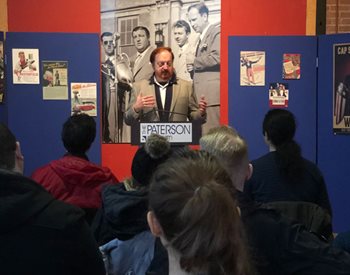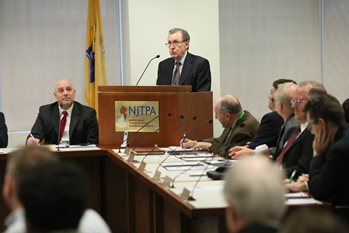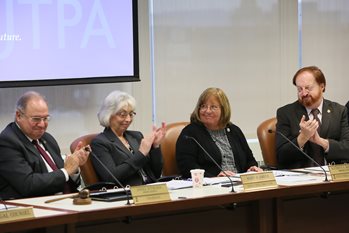January 2020
Posted: 1/28/2020 4:36:48 PM
 John Bartlett, NJTPA First Vice Chair and Passaic County Freeholder.
John Bartlett, NJTPA First Vice Chair and Passaic County Freeholder.
The NJTPA’s pilot advisory committee for young adults, UpNext North Jersey, is off to a strong start. After holding kickoff meetings at the NJTPA and in New Brunswick last fall, UpNext held its first subregion-based event at the Paterson Museum and the Great Falls in Passaic County on Jan. 25, 2010.
UpNext North Jersey was created to engage civic-minded young adults in the region’s transportation planning process. This new group was established in the Public Engagement Plan adopted by the NJTPA Board in 2018; it’s open to residents of the NJTPA region who are between 18 and 30 years old and has about two-dozen members.
Passaic County Freeholder John Bartlett who serves as NJTPA First Vice-Chair welcomed the group. He noted that many transportation projects take years to plan and build and NJTPA’s current long range plan looks out to 2045. “You will still be working in 2045,” he said, “so the kind of advance notice, if you will, that we get from having your voices in the room and participating in the dialog is incredibly important.” Video of Bartlett's remarks are
here.
The group learned about two NJTPA-funded studies underway, the Main Avenue Local Concept Development Study in the City of Passaic and the Paterson-Newark Transit Market Study. Members living and working in the area were encouraged to provide feedback for those studies. The group also provided general input on their transit use and technology and infrastructure improvements they’d like to see made in the future. This feedback will help inform the next long-range transportation plan.
Future events are planned for Asbury Park in March and Raritan Borough in early summer. More information about UpNext North Jersey is available at
www.njtpa.org/UpNext.
Posted: 1/21/2020 10:30:06 AM
 As the nation emerges from a decade of strong economic growth — which could be called the “roaring 2010’s” — New Jersey will have to address a series of demographic and affordability challenges to keep pace with other states. That is among the conclusions of the James W. Hughes, University Professor and Dean Emeritus of the Edward J. Bloustein School of Planning and Public Policy at Rutgers University, who addressed the NJTPA board at its January 13 meeting.
As the nation emerges from a decade of strong economic growth — which could be called the “roaring 2010’s” — New Jersey will have to address a series of demographic and affordability challenges to keep pace with other states. That is among the conclusions of the James W. Hughes, University Professor and Dean Emeritus of the Edward J. Bloustein School of Planning and Public Policy at Rutgers University, who addressed the NJTPA board at its January 13 meeting.
His presentation, “The Decade of Transformation: Economic and Demographic Disruptions,” was one in a series of presentations and forums designed to gather insights for NJTPA’s update of its long range transportation plan, with a horizon year of 2050.
Click here to view video of the presentation
Hughes began by offering statistical snapshots of the state. New Jersey has the second highest income among the 48 continental states, but he noted, “Our strong income metric often obscures our severe cost and housing affordability problem.” The state’s housing costs are the highest in the nation. In terms of transportation, the state is second in mass transit usage and third in the length of commute.
At the same time New Jersey has the densest population per square mile for any state — even higher than Japan or India — while it also has more forest acreage than states such as California or Alaska. The latter he said demonstrates “our unique environment and quality of life.”
Yet New Jersey’s job growth over the last decade of 11 percent trailed the 17 percent growth in the nation overall. He said it will likely continue to lag in coming years.
In addition to affordability and other issues, he said, the modest performance is tied to demographic shifts. In particular, the state — like the entire northeast U.S. — is losing population to states in the south and west. International migration and birth rates have helped make up for the loss.
“International migration has become our demographic engine,” he said. With 23 percent of the state population being foreign-born, immigration is a “benchmark of our unique demographic diversity and that’s a key advantage in a global economy,” Hughes said.
Other impending challenges, according to Hughes, relate to the generational transformation underway. The nation’s population is aging with more people over 65 than under 18 for the first time. While the baby boom generation still holds more than half the nation’s wealth, the smaller Generation X is poised to take over vacated leadership positions and the giant millennial generation has become the largest segment of the labor force. Its growing family formation will reshape housing and other markets. Behind them are Generation Z and Generation Alpha. Each generation is more diverse than the last, owing to immigration, he said
“A new imperative is connecting across generations, promoting social and economic linkages between young and old,” Hughes said.
Despite these concerns, Hughes remains hopeful for the future, citing a steady New Jersey economy benefitting from the nation’s continued economic expansion. But he cautions, “We may be approaching the point where the region may have to be remarketed or rebranded to compete in this new era of rolling disruptions and regional shifts.”
Posted: 1/13/2020 12:46:44 PM
 Morris County Freeholder Kathryn A. DeFillippo was elected to a two-year term as Chair of the North Jersey Transportation Planning Authority (NJTPA) at the Jan. 13 Board of Trustees meeting.
Morris County Freeholder Kathryn A. DeFillippo was elected to a two-year term as Chair of the North Jersey Transportation Planning Authority (NJTPA) at the Jan. 13 Board of Trustees meeting.
“I am honored that my fellow Board members have entrusted me to serve as chair of the NJTPA,” Freeholder DeFillippo said. “This is a critical time for transportation in North Jersey as we continue to make the case for new rail tunnels under the Hudson River and plan for emerging technologies that can improve mobility. I look forward to working with the Board, our many partners and NJTPA staff to improve transportation and quality of life for our region’s residents.”
The NJTPA oversees regional transportation planning and annually authorizes more than $1 billion in federal surface transportation funding for 13 counties in northern and central New Jersey.
Chairwoman DeFillippo also recognized outgoing chairman Angel Estrada, a Union County freeholder.
“Freeholder Estrada was a dedicated leader who helped this board accomplish many things during his term,” Chairwoman DeFillippo said. “He has been a strong advocate for enhancing equity, improving mobility and strengthening the economy. I thank him for his leadership and look forward to our continued work on the Board.”
Freeholder DeFillippo joined the NJTPA Board in 2014. She was first elected as a member of the Board’s Executive Committee in 2016, serving two years as Board Secretary. In 2018 she was appointed to a two-year term as Third Vice-Chair. She most recently served as Chair of the NJTPA’s Project Prioritization Committee and is a past Chair of the Freight Initiatives Committee.
Chairwoman DeFillippo was first elected to the Morris County Board of Chosen Freeholders in 2013. Prior to being elected freeholder, she was a councilwoman in Roxbury Township from 2006 to 2013, serving as mayor in 2009 and deputy mayor in 2011, 2012 and 2013.
She has a long history of public and community service. She is a past president of the Roxbury Area Chamber of Commerce and retired in 2016 from the board of the NJ Metro Chapter of the National MS Society (NMSS) after serving as a trustee for 10 years. Still an active member of NMSS, she was a driving force in bringing the Walk MS to Roxbury in 2006 and continues to serve as a fundraiser for the event.
NJTPA Board of Trustees Executive Committee
At the meeting, the NJTPA Board also selected four other members of its Executive Committee. In addition to Freeholder DeFillippo, the elected members of the Executive Committee are: Passaic County Freeholder John Bartlett, First Vice-Chair; Ocean County Freeholder John P. Kelly, Second Vice-Chair; and Warren County Freeholder Jason Sarnoski, Secretary. In accordance with the bylaws, Chairwoman DeFillippo appointed Middlesex County Freeholder Charles Kenny to the position of Third Vice-Chair.
The Executive Committee provides guidance and leadership to the full Board on a wide range of planning, policy and administrative issues. It meets as needed to review financial, personnel and policy matters. Board membership is an uncompensated position.